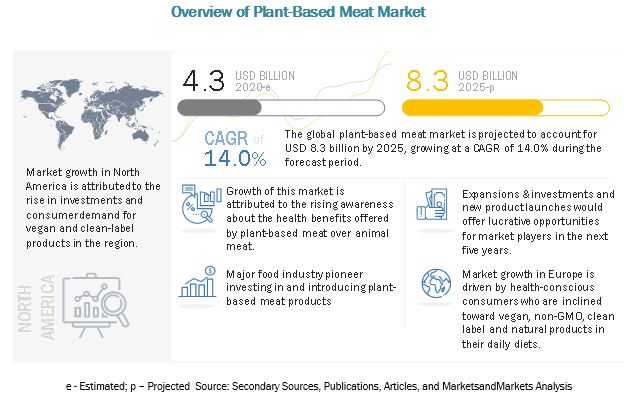The report “Plant-based Meat Market by Source (Soy, Wheat, Pea, & Other Sources), Product (Burger Patties, Strips & Nuggets, Sausages, Meatballs, & Other Products), Type (Beef, Chicken, Pork, Fish, & Other Types), Process, and Region – Global Forecast to 2025″ According to MarketsandMarkets, the global plant-based meat market size is estimated to be valued at USD 4.3 billion in 2020. It is projected to reach USD 8.3 billion by 2025, recording a CAGR of 14.0% in terms of value. Growing vegan and flexitarian populations across the world, rising awareness about the health benefits offered by plant-based meat over animal meat, and growth in government initiatives along with significant investments are driving the global plant-based meat market.

Report Objectives:
- To describe and forecast the plant-based meat market, in terms of source, product, type, and region
- To describe and forecast the plant-based meat market, in terms of value, by region–North America, Europe, Asia Pacific, and the Rest of the World—along with their respective countries
- To provide detailed information regarding the major factors influencing the market growth (drivers, restraints, opportunities, and challenges)
- To strategically analyze micro-markets with respect to individual growth trends, prospects, and contributions to the overall market
- To study the complete value chain of the plant-based meat market
Download PDF Brochure: https://www.marketsandmarkets.com/pdfdownloadNew.asp?id=44922705
Market Dynamics:
Drivers: Rising Awareness About The Health Benefits Offered By Plant-Based Meat Over Animal Meat
The plant-based trend continues to grow, encouraging people to eat more fruits, vegetables, legumes, nuts, and seeds. Also, there are various health benefits associated with plant-based products, about which consumers are getting more aware recently. Excessive consumption of animal-based meat may result in diet-related diseases such as obesity, type-2 diabetes, heart disease, and certain cancers. On the other hand, the consumption of plant-based meat does not give rise to such diseases. Moreover, they aid in building better immunity. The nutritional benefits of plant-based meats and their safety compared with conventional meat are also some of the important factors that have been contributing to gaining the attention of consumers.
Plant-based meat products are significantly replacing conventionally processed meat products such as burgers, sausages, and nuggets. Plant-based meat contains lower levels of saturated fat, cholesterol, and calories than animal-based meat. They often contain higher levels of micronutrients, such as zinc, iron, and calcium.
Restraints: Higher price of products in comparison to traditional meat
Price is one of the major restraining factors in the plant-based meat market. Plant-based meat is uneconomical when compared to animal-based meat, which is likely to impact its growth in price-sensitive markets such as India, China, and South Africa. Companies offering plant-based meat alternatives are trying to reduce prices, as their high price over conventional meat hinders the rapidly growing plant-based industry.
Plant-based meat is more expensive than regular meat. The prices of plant-based meat products are further expected to increase due to trade barriers, disruptions in the supply of raw materials, and inefficient distribution channels due to COVID-19. The non-availability and high cost of raw materials and high production costs are likely to restrain the growth of the global plant-based meat market. Plant-based meat market growth is further grappled due to the economic slowdown in various countries due to the coronavirus outbreak.
By source, pea is projected to be the fastest growing segment in the plant-based meat market during the forecast period
Based on source, pea is the fastest growing segment in the plant-based meat market. Pea serves as an alternative for consumers with a soy allergy. The characteristic of pea protein, which is appealing, is its lack of allergenicity and its amino acid profile. It is perceived as a clean-label ingredient and has the added benefits of being soy-free, gluten-free, and lactose-free. Beyond Meat (US) uses pea protein for producing meat alternatives, lending a chewy, meat-like texture to their products. Beyond Meat’s (US) veggie burger consists of pea as one of the key ingredients. The company is joined by Lightlife Foods (US), which, in 2019, expanded its plant-based meat product offerings with the launch of a veggie burger with pea as one of the key ingredients.
Request for Customization: https://www.marketsandmarkets.com/requestCustomizationNew.asp?id=44922705
Europe is projected to account for the largest market share during the forecast period
The European market accounted for the largest share in 2019. In Europe, the growing vegan trends, especially in the UK, is expected to increase demand for plant-based meat products. North America is the hub for the plant-based meat market, as the region is backed by start-ups such as Impossible Foods Inc. (US) and Beyond Meat (US); which initiated the development of plant-based meat products. In the Asia Pacific region, plant-based food products are gaining popularity owing to the adaptation of healthy lifestyles, urging consumers to opt for natural ingredients. This is expected to boost sales of plant-based food. Furthermore, the demand for plant-based meat products is expected to increase in the coming years, owing to the growing health concerns among consumers related to animal-based protein sources, ethical concerns, and environmental concerns.
This report includes a study on the marketing and development strategies, along with the product portfolios of leading companies. It consists of profiles of leading companies, such as Beyond Meat (US), Impossible Foods Inc. (US), Maple Leaf Foods (Canada), The Vegetarian Butcher (Netherlands), Gardein Protein International (Canada), Morningstar Farms (US), Quorn Foods (US), Amy’s Kitchen (US), Tofurky (US), Gold&Green Foods Ltd. (Finland), Sunfed (New Zealand), VBites Food Limited (UK), Alpha Foods (US), Planterra Foods (US), Before the Butcher (US), No Evil Foods (US), Like Meat (Germany), The Meatless Farm Co. (England), Hooray Foods (US), and Yves Veggie Cuisine (Canada).
